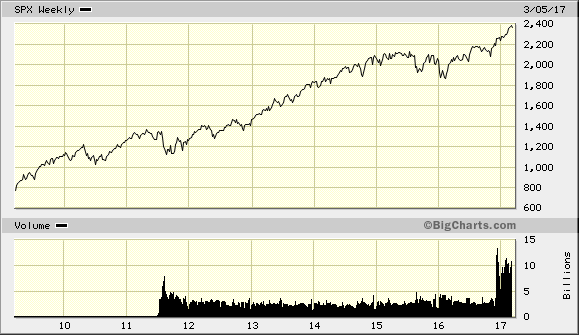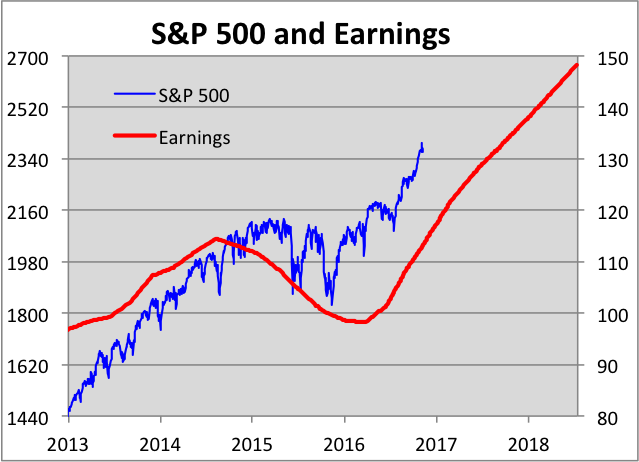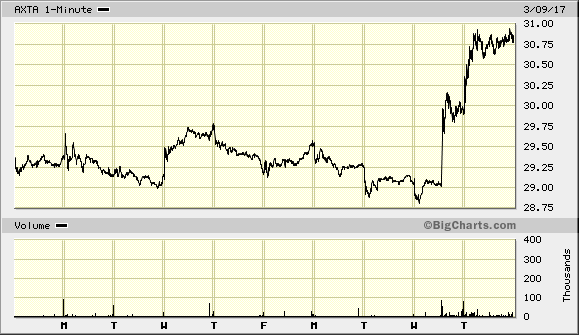CWS Market Review – March 10, 2017
“It’s waiting that helps you as an investor, and a lot of people just can’t stand to wait.” – Charlie Munger
Thursday marked the eighth anniversary of the start of the great bull market. Not only is this one of the longest and largest bull markets in history, it’s also one of the most hated.
I have to confess that I didn’t personally experience many of the other great rallies, but I doubt they were greeted with as much hostility as the present bull run. Over the last eight years, the S&P 500 has gained 246%. Yet it seems that from Day One, people have claimed that it was a crazy bubble induced by the Fed, and that it was due to pop at any moment.
They’ve been wrong, wrong and wrong. Naturally, you won’t hear any apologies. But I’m happy to say that by keeping our heads while everyone else was losing theirs (and blaming us!), our Buy List has made steady gains.
In this week’s issue, I want to look at some of the issues affecting Wall Street at the moment. It looks as if Janet Yellen is going to raise interest rates next week, but suddenly the stock market isn’t so worried about inflation. Also, for the first time this year, oil dropped below $50 per barrel. The Trump Trade is suddenly on the ropes! What does it all mean? We’ll also look at some of our Buy List stocks. But first, let’s look at this hated rally.
No, the Stock Market Is NOT a Bubble
Commentators love to proclaim that the stock market, and every market really, is a bubble. Hey, it’s an easy call to make. You’re rarely held accountable if you’re wrong. Also, you have an easy out. If the market goes higher, then you can always say that the bubble and its ensuing crash will be that much worse. The crash is always just around the corner.
I’ll let you in on a little secret: the stock market is rarely a bubble. Don’t get me wrong—the market takes its lumps. You can expect a 20% selloff every few years. But that’s not necessarily a bubble.
For example, the big bad bear market of 2007 to 2009 wasn’t, in my opinion, preceded by a bubble. By that I mean that I don’t believe that equity valuations were excessive. Prices largely reflected fundamentals. The problem is that the fundamentals crashed. Sure, there was a bubble, but it was in real estate. Or more precisely, it was in credit, which manifested itself in real estate. But stocks? Nope, nothing crazy.
For those of you who remember 1999-2000, now that was a bubble. The valuations had no bearing on reality. The flimsiest companies were going public. Why? Well, they were being funded! No one wanted to be left out. “Your company is nothing but a URL and a sock puppet? Here, take a few billion dollars.“
That’s what a bubble is all about. The tech bubble was so intense that it actually pulled money away from sensible value stocks. I remember that several REITs were yielding over 10% or 12%. My point is that a bubble isn’t merely elevated valuations but totally crazy, insane valuations. That happens, but it’s rare.
Now back to this market, and let’s bust out some math. The S&P 500 closed Thursday at 2,364.87. Last year, the S&P 500 earned $106.64 per share. That’s the index-adjusted number. The issue is that profits last year were held back for a variety of reasons, and we should expect a decent earnings rebound this year and next.
For 2017, Wall Street currently expects the S&P 500 to earn $130.67 per share. For 2018, the expectation is for $148.35 per share. Let me add an important caveat: Wall Street’s earnings are notoriously optimistic, especially that far out. It’s typical to see estimates gradually pared back as earnings day approaches.
Here’s a chart of the S&P 500 (blue line, left scale) along with its earnings (red line, right scale). The two lines are scaled at a ratio of 18 to 1. If the predicted earnings recovery is accurate, then the S&P 500 isn’t overpriced.
With that in mind, I think the Street’s estimates are reasonable, and that’s what we’re looking for. If the Street’s estimate for 2018 is accurate, that means the S&P 500 is currently going for 16 times next year’s earnings. To my mind, that’s a bit above average, but it’s hardly excessive. Let’s also remember that earnings estimates could be too pessimistic. The earnings estimates for Q3 and Q4 of this year are already higher than they were at the start of the year. It’s been a while since I’ve seen estimates go up!
So the more pressing concern for us right now isn’t excessive prices but rather the threat of a recession. Fortunately, that, too, doesn’t appear to be on the horizon. If anything, growth may be ramping up this year. I’m also relieved to see some bullish economic reports recently. Consumer confidence, for example, just touched its highest point since July 2001. Job growth is strong, and interest rates are still low. We’ll get the jobs report later this morning, but Wednesday’s ADP was very good. I’ll be more concerned about the threat of a recession when interest rates get higher. The good news is that we’re still a long way from that happening.
Let me summarize by encouraging you not be scared out of the market. We’ll see some ups and downs. After all, that’s what markets do. But there’s no reason for us to expect any severe troubles for the next several months. Investors should concentrate on a portfolio of high-quality stocks such as you’ll find on our Buy List.
Get Ready for Another Fed Rate Hike
A few weeks ago, Janet Yellen testified before Congress on monetary policy. At the time, Wall Street was pretty sure that the Fed wasn’t going to raise interest rates in March. Since then, several events have come together which have convinced traders that a March rate hike is in play. We had Janet Yellen all but admit that she’s going to raise rates again next week. The Fed’s meeting will be next Tuesday and Wednesday, March 14-15.
We can really trace the events back to the election when Wall Street was taken by the Trump Trade. Or another name for it is the Reflation Trade. The thinking behind the Reflation Trade was that President Trump would press for a large stimulus plan that would boost the economy and take a more relaxed approach to higher inflation. As a result, Industrial stocks rallied with Materials and Energy shares. At the opposite end, long-term bonds did poorly.
Six months ago, the five-year Treasury was going for 1.24% more than the five-year TIPs. That means Wall Street has been expecting inflation over the next five years to average 1.24%. Now it’s expecting inflation to average 1.90%.
Suddenly this week, the Reflation Trade backed off. The primary reason is that oil is sinking again. For the first time this year, West Texas Crude slipped below $50 per barrel. OPEC has tried to cut production, but there’s still a glut of oil. In the U.S., supplies have risen nine weeks in a row and are currently at an all-time record. The price of oil has fallen seven times in the last eight sessions.
The immediate effect of this is that Energy stocks have slipped over the past several days. In fact, the Energy ETF (XLE) is technically in correction territory, which is defined as a 10% drop from its high. What’s interesting is that falling oil has previously been tied to a rising stock market. That’s what happened in 2014-15. Now it appears to be a negative.
The stock market gapped up last Wednesday, after President Trump’s Congressional address. Since then, it’s gradually slipped back. The S&P 500 has now gone 82 days in a row closing within 1.5% of its all-time high. The streak very nearly came to an end on Thursday, but it was saved by an afternoon rally.
Over the last few issues, I’ve warned you to expect to see a modest pullback. I still think that’s quite possible. I simply want you to be aware of what’s happening. Most of all, there’s no need to panic. If anything, a pullback would be a great buying opportunity for disciplined investors.
There’s been some talk that the drop in oil might cause the Fed to forego a rate hike next week. Don’t count on it. The move in oil is too little, too late. Plus, the Fed has already announced its intentions. If it failed to follow through, its credibility would be shot. But if the Trump Trade continues to unravel, it could put off any further rate hikes for this year.
Buy List Updates
With no earnings reports this week, there’s not a whole lot to say about our Buy List stocks. I wanted to pass along two comments. One is that shares of Express Scripts (ESRX) dropped a bit after President Trump tweeted about drug prices. Companies like Express are easy targets to blame for higher drug prices, but these criticisms are off base. Don’t let the downdraft or tweets rattle you. Express Scripts is a very good buy if you can get it below $68 per share.
A U.S. company named PPG Industries made a $22 billion offer to buy Akzo Nobel, a Dutch company. Akzo said thanks, but no thanks. Once that happened, traders immediately thought PPG would turn its sights on someone else, and a leading candidate for someone else is our very own Axalta Coating Systems (AXTA).
Traders don’t mess around when speculating. AXTA jumped 2.9% on Wednesday and another 3% on Thursday. Bear in mind that there was absolutely no news on this.
It’s also just guessing by the market. I love AXTA, and I love seeing our Buy List stocks gap up, but let me caution you not to get your hopes up. Axalta is a great company, but don’t pin your hopes on a buyout.
That’s all for now. The big jobs report is later today. I think the Fed will raise rates even if the report is below expectations. More important will be the level of wages. The FOMC meets on Tuesday and Wednesday. The policy statement will come out on Wednesday afternoon, and it will be followed by a press conference with Janet Yellen. Be sure to keep checking the blog for daily updates. I’ll have more market analysis for you in the next issue of CWS Market Review!
– Eddy
Posted by Eddy Elfenbein on March 10th, 2017 at 7:08 am
The information in this blog post represents my own opinions and does not contain a recommendation for any particular security or investment. I or my affiliates may hold positions or other interests in securities mentioned in the Blog, please see my Disclaimer page for my full disclaimer.
- Tweets by @EddyElfenbein
-
-
Archives
- November 2024
- October 2024
- September 2024
- August 2024
- July 2024
- June 2024
- May 2024
- April 2024
- March 2024
- February 2024
- January 2024
- December 2023
- November 2023
- October 2023
- September 2023
- August 2023
- July 2023
- June 2023
- May 2023
- April 2023
- March 2023
- February 2023
- January 2023
- December 2022
- November 2022
- October 2022
- September 2022
- August 2022
- July 2022
- June 2022
- May 2022
- April 2022
- March 2022
- February 2022
- January 2022
- December 2021
- November 2021
- October 2021
- September 2021
- August 2021
- July 2021
- June 2021
- May 2021
- April 2021
- March 2021
- February 2021
- January 2021
- December 2020
- November 2020
- October 2020
- September 2020
- August 2020
- July 2020
- June 2020
- May 2020
- April 2020
- March 2020
- February 2020
- January 2020
- December 2019
- November 2019
- October 2019
- September 2019
- August 2019
- July 2019
- June 2019
- May 2019
- April 2019
- March 2019
- February 2019
- January 2019
- December 2018
- November 2018
- October 2018
- September 2018
- August 2018
- July 2018
- June 2018
- May 2018
- April 2018
- March 2018
- February 2018
- January 2018
- December 2017
- November 2017
- October 2017
- September 2017
- August 2017
- July 2017
- June 2017
- May 2017
- April 2017
- March 2017
- February 2017
- January 2017
- December 2016
- November 2016
- October 2016
- September 2016
- August 2016
- July 2016
- June 2016
- May 2016
- April 2016
- March 2016
- February 2016
- January 2016
- December 2015
- November 2015
- October 2015
- September 2015
- August 2015
- July 2015
- June 2015
- May 2015
- April 2015
- March 2015
- February 2015
- January 2015
- December 2014
- November 2014
- October 2014
- September 2014
- August 2014
- July 2014
- June 2014
- May 2014
- April 2014
- March 2014
- February 2014
- January 2014
- December 2013
- November 2013
- October 2013
- September 2013
- August 2013
- July 2013
- June 2013
- May 2013
- April 2013
- March 2013
- February 2013
- January 2013
- December 2012
- November 2012
- October 2012
- September 2012
- August 2012
- July 2012
- June 2012
- May 2012
- April 2012
- March 2012
- February 2012
- January 2012
- December 2011
- November 2011
- October 2011
- September 2011
- August 2011
- July 2011
- June 2011
- May 2011
- April 2011
- March 2011
- February 2011
- January 2011
- December 2010
- November 2010
- October 2010
- September 2010
- August 2010
- July 2010
- June 2010
- May 2010
- April 2010
- March 2010
- February 2010
- January 2010
- December 2009
- November 2009
- October 2009
- September 2009
- August 2009
- July 2009
- June 2009
- May 2009
- April 2009
- March 2009
- February 2009
- January 2009
- December 2008
- November 2008
- October 2008
- September 2008
- August 2008
- July 2008
- June 2008
- May 2008
- April 2008
- March 2008
- February 2008
- January 2008
- December 2007
- November 2007
- October 2007
- September 2007
- August 2007
- July 2007
- June 2007
- May 2007
- April 2007
- March 2007
- February 2007
- January 2007
- December 2006
- November 2006
- October 2006
- September 2006
- August 2006
- July 2006
- June 2006
- May 2006
- April 2006
- March 2006
- February 2006
- January 2006
- December 2005
- November 2005
- October 2005
- September 2005
- August 2005
- July 2005




 Eddy Elfenbein is a Washington, DC-based speaker, portfolio manager and editor of the blog Crossing Wall Street. His
Eddy Elfenbein is a Washington, DC-based speaker, portfolio manager and editor of the blog Crossing Wall Street. His